|
|
|
Sort Order |
|
|
|
Items / Page
|
|
|
|
|
|
|
| Srl | Item |
| 1 |
ID:
120352
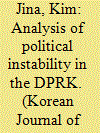

|
|
|
| 2 |
ID:
112735
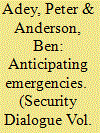

|
|
|
|
|
| Publication |
2012.
|
| Summary/Abstract |
In this article, we examine contemporary 'resilience' through UK preparedness - an apparatus of security enacted under the legal and organizational principles of UK Civil Contingencies and civil protection legislation and practices. By examining the design, practices and technologies that constitute the exercises performed within Civil Contingencies, the article first suggests that the manner in which exercises have been mobilized as examples of preparedness and apocalyptical imaginations of the 'unthinkable' should be understood within the highly specific societal and political contexts that shape them. More substantially, the article then provides a nuanced understanding of the life of the security assemblage through an in-depth analysis of the exercise and its design, materials, play and contingent relations. Seeking to deepen and widen concerns for what matters in security studies, animated by concern for objects, bodily affects, contingencies and excess, the article contends for a more serious concern with how security and its practices can surprise, shock, enthral and disrupt in a manner that need not only be associated with failure.
|
|
|
|
|
|
|
|
|
|
|
|
|
|
|
|
| 3 |
ID:
182004
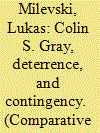

|
|
|
|
|
| Summary/Abstract |
Most scholars as well as practitioners in strategic studies recognize that deterrence is contingent upon the opponent choosing to be deterred. This recognition was a contribution made by Colin Gray to deterrence theory, forcefully if not strictly uniquely, on the basis of the theory of strategy. Although relating the nature of strategy to deterrence led to a powerful reinterpretation of the importance of actor agency in deterrence, it is nonetheless still an incomplete, albeit foundational, appreciation of agency and contingency. To understand fully the role of agency in deterrence, one must also relate it to the nature of political relationships, and thereby identify another contingency point in deterrence.
|
|
|
|
|
|
|
|
|
|
|
|
|
|
|
|
| 4 |
ID:
147711
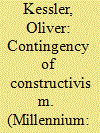

|
|
|
|
|
| Summary/Abstract |
This article argues that constructivism has not engaged with the concept of contingency sufficiently. While such noted constructivists as Onuf, Kratochwil, and Wendt often refer to ‘double contingency’, it is the concept of ‘norms’ rather than ‘contingency’ that is used to characterise constructivist theorising in International Relations (IR). In this article, I outline how moderate and radical constructivists differ in their take on norms and thereby establish how the problem of contingency is actually at the core of constructivist theorising. The discussion then shows how Kratochwil, Onuf, and Wendt have made use of double contingency while moderate constructivists have re-introduced the single actor to show how norms ‘cause’ action. The third part moves beyond the double contingency framework. By differentiating ‘the social’ from ‘society’, this section shows that a ‘third’ position can be identified. The concept of ‘triple contingency’ then could be a way ahead for the theoretical discussion on constructivism itself.
|
|
|
|
|
|
|
|
|
|
|
|
|
|
|
|
| 5 |
ID:
190378
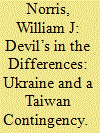

|
|
|
|
|
| Summary/Abstract |
When and if a Taiwan contingency were to ever unfold, there is likely to be a natural tendency to refer to the Ukraine experience as a reference from which to draw strategic lessons. While there are some structural similarities between the Ukraine war and some future Taiwan scenario—and certain preferences and courses of action may look familiar—attention ought to be more focused on areas in which they diverge. Drawing on US economic statecraft responses to the Russian invasion of Ukraine, I suggest that a Taiwan contingency may prove more challenging, and that parts of the US government should proactively take measures today to enhance our position in any future conflict involving Taiwan. Across the more than 30 departments and agencies in the US government that are responsible for some element of economic statecraft, there is a pressing institutional need to engage in economic statecraft capacity building. Economic statecraft takes on a wide variety of forms well beyond sanctions. We need to improve both our understanding of economic statecraft as well as our institutional capacity to wield this important tool of national power. The time to do that is now, not in the middle of an acute crisis.
|
|
|
|
|
|
|
|
|
|
|
|
|
|
|
|
| 6 |
ID:
143557
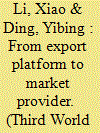

|
|
|
|
|
| Summary/Abstract |
Since the 1990s China’s development of a market-oriented economy and its engagement with globalisation have given it a role as the primary export platform of a globalised Asian economy. This has not only promoted the exports of capital and intermediate goods of the other leading Asian economies, but has also stabilised the fluctuations of the Asian economy and deepened the regional production networks in the US-dominated global economic system. As China is entering an economic ‘new normal’, its economic structure and growth pattern will experience a period of transition. Thus its role in the Asian economy and the global economic system will change. China’s new role as a market provider for the final consumer goods from the region might increase. China’s efforts to reform its domestic economy and develop regional economic cooperation arrangements will helpful in accomplishing this role change, but various uncertainties and contingencies might continue to pose obstacles for this process.
|
|
|
|
|
|
|
|
|
|
|
|
|
|
|
|
| 7 |
ID:
190694
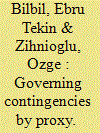

|
|
|
|
|
| Summary/Abstract |
Contingencies comprise immediate possibilities and aleatory interactions in the form of calculated responses to mutual uncertainties. While contingencies are critically important to governmental policies, yet they have been rarely considered in social analysis. The aim of this study is to analyze how the Covid-19 pandemic as a crisis has been governed both against and through contingencies by investigating the social support measures initiated by the Turkish government and the Istanbul Metropolitan Municipality (IMM). We gathered empirical data qualitatively from 12 in-depth interviews with the officers of local government and NGOs, supplemented by official documents. We found that contingencies are produced and become residual through configurational interdependencies, such as competition between the central and local government, unemployment, inadequate support, standardization, path dependency, and lack of diversification in need assessment. This study revealed that governmental practices are governed through contingent possibilities and interactions under mutual uncertainty and the politics of crisis management and conflict between local and central authority changed social support mechanisms.
|
|
|
|
|
|
|
|
|
|
|
|
|
|
|
|
| 8 |
ID:
168399
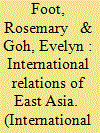

|
|
|
|
|
| Summary/Abstract |
East Asia is a region of signal importance for global order because of its economic dynamism and growing heft, China's challenge to the United States as incumbent regional and global hegemon, and other conflict hotspots like the Korean peninsula. This requires academic analysis that both appreciates the subtleties inherent to this region and can relate them to the wider systemic context. Many analysts have begun to allude to the challenging characteristics that are present in the international relations of East Asia, in particular struggling to explain how growing levels of economic interdependence can coexist with heightened security tensions. This article offers a research prospectus that suggests ways of analyzing these apparently contradictory trends. It proposes the development of research questions and approaches that are more suited to studying the international relations of a region with characteristics that we define as dual, hybrid, and contingent. We propose a Conjunctions Analytical Framework that explores what happens at the conjunctions of the regional-global and the unit-regional/global levels of analysis—the “grey areas” where social formations meet and interact. We aim to help shape the future study of the IR of East Asia and to suggest more effective ways of analyzing the complex reality of East Asia's regional and global politics.
|
|
|
|
|
|
|
|
|
|
|
|
|
|
|
|
| 9 |
ID:
091662
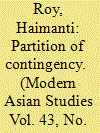

|
|
|
|
|
| Publication |
2009.
|
| Summary/Abstract |
The historiography on the Partition of Bengal has tended to see it as a culmination of long-term trends of Hindu and Muslim communalism within the province. This essay offers a counter-narrative to the 'inevitability' of the Partition by focusing on Bengali public discourse in the months leading up to the Partition. The possibility of a division generated a large-scale debate amongst the educated in Bengal and they articulated their views by sending numerous letters to leading newspapers, district political and civic organizations and sometimes published pamphlets for local consumption. A critical examination of these public debates for and against Partition reveals the countdown to August 1947 as a period of multiple possibilities. Rather than being pre-determined, the stands for a separate or a United Bengal were contingent in nature. Understanding the genesis provides the starting point and the necessary corrective to evaluate India's path to post-colonial nationhood
|
|
|
|
|
|
|
|
|
|
|
|
|
|
|
|
| 10 |
ID:
112747
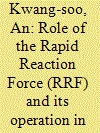

|
|
|
|
|
| Publication |
2012.
|
| Summary/Abstract |
Following the end of the Cold War, the world has seen the proliferation of various
regional conflicts and disputes. On the Korean peninsula, ROK forces have been
successful in deterring the North's attempts at all-out war since the end of the Korean
War, but not in local provocations by the North. The North's local provocations
continue to become more intense and diversified as shown in the attacks on the
ROKS Cheonan and the shelling of Yeonpyeong Island. Meanwhile, China and
Japan vie with each other to modernize their military forces and demonstrate
aggressive policies in pursuit of marine interests. These conditions remain a potential
source of conflict in the region.
Major countries, such as the United States, Russia, China, and Japan as well as
NATO have thus organized and operated Rapid Reaction Forces (RRFs) to cope
promptly with diverse contingency situations amid the uncertainty of the current
security environment. The operation of RRFs is based on the expectation that
gains earned by quickly controlling a contingency situation or preventing it from
escalating into war are much greater than the expense incurred for operation of
RRFs, with the additional benefit of reduction in the loss of human lives and military
expenditure. The ROK finds itself in a similar situation, requiring the operation of
RRFs to cope with threats to national security amid an increase in the North's
local provocations and threats associated with other potential conflicts.
This study proposes operational strategies for maintaining RRFs suited to the local
environment of the ROK, based on examples from major countries currently
operating their own RRFs. This study also defines the desired role of RRFs in light
of the security situation and operational environment on the Korean peninsula and
presents a realistic view concerning how best to organize and operate RRFs to
cope with the North's local provocations and conflicts associated with potential
threats from other countries.
|
|
|
|
|
|
|
|
|
|
|
|
|
|
|
|
| 11 |
ID:
108408
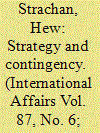

|
|
|
|
|
| Publication |
2011.
|
| Summary/Abstract |
The determination that strategy should have a long-term predictive quality has left strategy seemingly wanting when having to address what are currently called 'strategic shocks', such as the recent Arab Spring and the NATO commitment to Libya. The focus on grand strategy, particularly in the US, is responsible for this trend. Its endeavour to mitigate risk in the national interest is inherently conservative, rather than opportunistic, and it is favoured and probably required by powers that are committed to the status quo, that need to manage diminishing resources, and that are dealing with relative decline. Strategy as traditionally but more narrowly defined by generals for use in a military context, is much more exploitative and proactive. Precisely because it is designed to be used in war it presumes that its function is offensive, that it will have to deal with chance and contingency, and that its aim is change. Its task is to deal with the uncertainties of war, and to respond to them while holding on to long-term perspectives. Clausewitz addressed the issue of 'war plans' in book VIII of On war, but the thinker who did most to inject planning into European strategic thought was Jomini. His influence has permeated much of American military thinking. The effect of nuclear planning in the Cold War was to ensure that strategy at the operational level became conflated with broader views of grand strategy-not least when the Cold War itself provided apparent continuity to strategic thought. Since 1990 we have been left with a view of strategy which fails to respond sensibly to chance and accident. Strategy needs context, and a sense of where and against whom it is to be applied. Its core task is to embrace contingency while holding on to long-term national interests.
|
|
|
|
|
|
|
|
|
|
|
|
|
|
|
|
| 12 |
ID:
176756
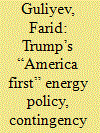

|
|
|
|
|
| Summary/Abstract |
The global energy system is in transition to a new energy order characterized by the emergence of the United States as a net oil exporter, the shale revolution and the gradual shift towards low-carbon sources and renewables. The shale boom in the US was a game changer, as was the election of Donald Trump as US president. Trump pushed an ambitious “America first” agenda aimed at transforming the US into a global energy superpower. The purpose of this article is two-fold: first, it outlines the key pillars of the emerging global energy order. Second, it underscores the role of contingent events, a factor neglected by some previous studies because of their reliance on what A.O.Hirschman (1970) termed “paradigmatic thinking”. The recent transition in the international energy order is an outcome of two paramount, yet largely unanticipated events: the shale revolution in the US and Trump’s neomercantilist and unilateralist economic policies. While contingencies are an inherent feature of social reality, the scenario approach can be a useful heuristic for dealing with uncertainties. The article concludes by discussing the implications of these developments for global energy governance.
|
|
|
|
|
|
|
|
|
|
|
|
|
|
|
|
| 13 |
ID:
117169
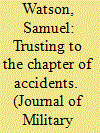

|
|
|
| 14 |
ID:
081458
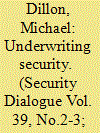

|
|
|
|
|
| Publication |
2008.
|
| Summary/Abstract |
This article enframes `risk' as a biopolitical security technology. It explains how biopolitics of security take life as their referent object of security; how the grid of intelligibility for biopolitics is economic; and how, in the second half of the 20th century, life also came to be understood as emergent being. Contingency is constitutive especially of the life of emergent being, and so the article argues that a biopolitics of security that seeks `to make life live' cannot secure life against contingency but must secure life through governmental technologies of contingency. Risk is one of these technologies. The article also explains how risk has come to pervade the biopolitics of security of the 21st century, and how, through the way in which it is traded on the capital markets, it has begun to acquire the properties of money. The article closes by describing how the biopolitics of security differ from traditional prophylactic accounts of security, and how these biopolitics of security exceed the liberal political thinking that rationalizes and legitimates them
|
|
|
|
|
|
|
|
|
|
|
|
|
|
|
|
|
|
|
|
|